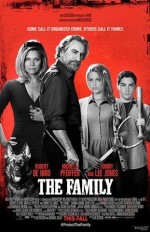The Family

Luc Besson‘s The Family is filled with his signature visual wit, boasting occasionally sharp satire aimed equally at both sides of the Atlantic, but he lets us down in the end, through the deadly combination of broad characters and a rambling narrative that doesn’t really know where it’s going or why.
Giovanni Manzoni, aka Fred Blake (aka Robert De Niro) is an old-school New York Mafioso on the lam due to a $20 million bounty on his head after ratting out his old comrades. It could be an inspired bit of casting, De Niro playing the ruminative version of Jimmy Conway or the like — wondering what went wrong with his life — but Gio isn’t particularly remorseful, and all we get from De Niro is a certain listlessness as sits through his scenes trying to beat Tommy Lee Jones‘ FBI agent in a sad-face competition.
He’s upstaged by his family most of the time, particularly daughter Belle (Dianna Agron), who has inherited his violent temperament and her mother’s apathy for mob life, while son Warren (Jon D’Leo) prepares himself to enter the family business by fleecing the local high-schoolers. None of the adults seem at all as interested in whatever it is they’re supposed to be doing, leaving Besson on his own to try and wring whatever humor and entertainment he can out of this thing.
The thing is, he’s actually got some decent ingredients to start with. Hiding in Witness Protection in continental Europe, Gio and his family have set up shop in the Normandy countryside and begun the task of trying to fit in; a task not helped by all the neighbors judging them for being too American while they frequently judge everyone else for not being American enough. It’s the basis for what could be some decent satirical comment — counterpointing the way Europeans view Americans and vice versa — and early on, it looks like that’s the kind of movie Besson is actually interested in making.
But just as quickly as it’s brought up, it’s let go, in order to move on to safer ground, like the way Gio resorts to street violence whenever he’s interrupted or treated with what he views as disrespect. It’s hard to tell whether Besson and co-writer Michael Caleo (loosely adapting Tonino Benacquista‘s novel Malavita) were unsure of how a subtle satire on perception of America would play and opted for broad almost-comedy instead, or if they just picked the crap that stuck to the wall the best, forgetting that it’s still crap regardless of its wall-sticking abilities.
Besson himself has lost none of his visual chops over the years, and most of the bits that do work — and there are quite a number that do — are down to the tight visual style he’s perfected with cinematographer Thierry Arbogast and editor Julien Rey. But he’s hamstrung by the fact that The Family isn’t much of one, with the characters quickly splitting up and rarely crossing paths as they bring their Cosa Nostra sensibilities to the banal problems of everyday life in the way that was much funnier in My Blue Heaven and probably any other comedy dealing with Witness Protection: all Belle wants is a nice boyfriend to make her forget why she’s in Europe in the first place; all mother Maggie (a wasted Michelle Pfeiffer) wants to is to lay low and forget what they did in America; and all Gio wants is to be able to get a drink of clear water out of his kitchen sink. None of these disparate paths ever cross each other; you can be forgiven for forgetting Pfeiffer is even in the film, revealing the underlying lack of structure undoing so much of Besson’s hard work.
Gio spends more time wrangling with his FBI handler (Jones) than he does actually communicating with his family (distancing him and us from any sort of narrative tension along the way), which Besson tries to fix by reminding us of hitmen still out looking for them all. But by the time they track the family down to Normandy and arrive to bring them back for some good old-fashioned Mafia justice, the story has already moved on, and so have we. No one can seem to sit still long enough to decide what The Family should be about or even seem to differentiate between the good ideas (Gio asked by the town film club to provide insight into the real world behind Goodfellas) and the bad ones (Belle threatening to kill herself when her college boyfriend won’t commit). By the time the bad guys and the worse guys actually start shooting at each other, it’s hard to care why.
Like a mediocre Balzac novel (yeah, they exist), the skill and style of the storyteller can cover up most of The Family‘s pitfalls, but not the big one waiting in the road for the next unsuspecting passenger to come along. Nothing in the film ever really connects together, leaving us with little to show for our time but disparate, well-produced sequences flying away from each other like a handful of sand thrown into wind.
Cast: Robert De Niro as Fred Blake/Giovanni Manzoni; Michelle Pfeiffer as Maggie Blake; Dianna Agron as Belle Blake; Jon D’Leo as Warren Blake; Tommy Lee Jones as Robert Stansfield; Jimmy Palumbo as Di Cicco; Domenick Lombardozzi as Caputo; Stan Carp as Don Luchese; Vincent Pastore as Fat Willy; Jon Freda as Rocco; Michael J. Panichelli, Jr. as Billy the Bug; Paul Borghese as Albert; Anthony Desio as Bernie; Ted Arcidi as Tommy; David Belle as Mezzo.



Leave a Reply